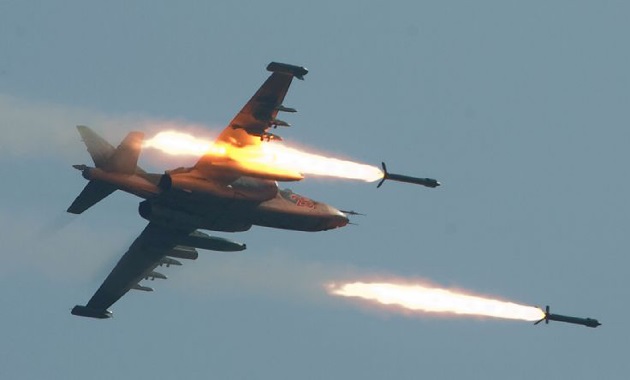By Sergei Blago
As the Kremlin rushed to get involved in the Syrian conflict, the Russian airstrikes were presented in Moscow as pre-emptive moves. In its first military engagement outside the former Soviet Union since the war in Afghanistan, Russia launched airstrikes in Syria Wednesday. The Russian Defense Ministry reported that Russian jets made 20 sorties and hit eight ISIS targets.
On September 30, President Vladimir Putin suggested to act pre-emptively so as to fight “terrorists” in Syria. He warned that if terrorists succeeded in Syria, they would then come to Russia. But Putin insisted that the scale of the Russian military operations in Syria would remain limited.
Nonetheless, the Russian air strikes came as a major move to defy the West. Since earlier this year, Putin has been advocating a broad international coalition against ISIS and insisted that Russian efforts were aimed to counter terrorists and militants in Syria and elsewhere.
Following the start of its airstrikes in Syria, Russia called on the United Nations Security Council to unite in the fight against terrorist groups.
The Federation Council, the upper house of Russian parliament, unanimously approved the use of force abroad Wednesday. Just a few hours afterwards, Russian military were reported to conduct airstrikes near Homs, a rebel stronghold in Syria. On September 30, the Russian Foreign Ministry strongly denied Western media reports that the airstrikes in Syria were not aimed at Islamic State and entailed civilian casualties. The foreign ministry dismissed these reports as an “information war” against Russia. Putin spokesman Dmitry Peskov also dismissed reports that Russia demanded that American planes stayed out of Syrian skies.
The theory of pre-emptive military action apparently gained domestic support in Russia. Ramzan Kadyrov, head of Russia’s once rebellious Chechnya region, advocated deployment of ground troops in Syria. If Russian infantrymen are needed in Syria, the Chechens will be the first to volunteer, he was quoted as saying. We should not wait till terrorists will come to our homes, Kadyrov added. Rustam Minnikhanov, head of Russia’s Tatarstan region, also argued that the airstrikes would not allow ISIS to expand further. Both Chechnya and Tatarstan are Russia’s predominantly Islamic regions. There were other voices of domestic support as well. Russia’s Orthodox Church reportedly hailed airstrikes in Syria as a “Holy war.”
Russia’s main former-Soviet opponent, Ukraine, remained critical. Ukrainian President Petro Poroshenko repeatedly suggested to distrust Russian calls for joint action in the fight against terrorism. Alexander Turchinov, head of Ukraine’s National Security Council, claimed that the Federation Council’s authorization to use force abroad was vaguely worded, so Russia could attack any country. Coincidentally, Konstantin Kosachyov, head of the international affairs committee of the Russian parliament’s upper house, reportedly hinted that Russia could strike ISIS beyond Syria’s border.
Meanwhile, on September 30 Russia’s closest allies, Belarus and Kazakhstan, as well as the Russia-led security alliance, Collective Security Treaty Organization (CSTO), remained largely silent on the airstrikes. Earlier this month, the heads of states of the CSTO voiced concerns about a possible infiltration of ISIS militants from Afghanistan into Central Asian states, and probably Russia too. However, on September 30 they remained slow to comment on the Russian airstrikes against ISIS.
The silence of Russia’s closest allies appeared to indicate their great concerns about the latest developments as the Kremlin opted for a dicey path of military action.
‘Courtesy Asia Times Online’.


